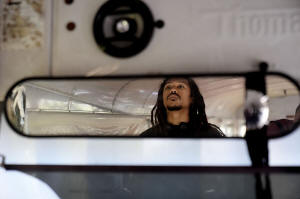Benin grants citizenship to slave descendants as it faces its own role
in the trade
 Send a link to a friend
Send a link to a friend
 [December 14, 2024]
By MARK BANCHEREAU [December 14, 2024]
By MARK BANCHEREAU
DAKAR, Senegal (AP) — When Nadege Anelka first came to the West African
country of Benin from her home island of Martinique, a French overseas
territory in the Caribbean, the 57-year-old travel agent said she had a
feeling of deja vu.
“A lot of the people reminded me of my grandparents, the way they wore
their headscarves, their mannerisms, their mentality,” she said.
Feeling at home in Benin, Anelka decided to settle there last July and
open a travel agency. She hopes to become a citizen by taking advantage
of a law passed in September that grants citizenship to those who can
trace their lineage to the slave trade.
The new law is part of a broader effort by Benin to reckon with its own
historical role in the slave trade.
The law is open to all over 18 who do not already hold other African
citizenship and can provide proof that an ancestor was deported via the
slave trade from anywhere in sub-Saharan Africa. Beninese authorities
accept DNA tests, authenticated testimonies and family records.
Anelka used “Anchoukaj" ("Affiliation” in Antillean Creole), a website
recognized by Benin to trace her heritage, proving that her ancestors
were slaves in Martinique. If her application is successful, she will
receive a provisional certificate of nationality valid for three years.
To get citizenship, she'll be required to stay at least once in Benin
during that period.

Benin is not the first country to grant citizenship to descendants of
slaves. Earlier this month, Ghana naturalized 524 African Americans
after the West African country’s president, Nana Akufo-Addo, invited
them to “come home” in 2019, as part of the 400th anniversary of the
arrival of the first enslaved Africans in North America in 1619.
But Benin’s citizenship law carries added significance in part because
of the role it played in the slave trade as one of the main points of
departure.
An estimated 1.5 million slaves were deported from the Bight of Benin, a
territory that includes modern-day Benin and Togo and part of modern-day
Nigeria, said Ana Lucia Araujo, a professor of history at Howard
University who has spent years researching Benin’s role.
The coastal town of Ouidah was one of Africa’s most active slave-trading
ports in the 18th and 19th centuries. Close to a million men, women and
children were captured, chained and forced onto ships there, mainly
destined for what would become the United States and Brazil and the
Caribbean.
Benin has struggled to resolve its legacy of complicity. For over 200
years, powerful kings captured and sold slaves to Portuguese, French and
British merchants.
The kingdoms still exist today as tribal networks, and so do the groups
that were raided. Rumors that President Patrice Talon is a descendant of
slave merchants sparked much debate while he was running for office in
2016. Talon has never publicly addressed the rumors.
Benin has openly acknowledged its role in the slave trade, a stance not
shared by many other African nations that participated. In the 1990s,
Benin hosted an international conference, sponsored by UNESCO, to
examine how and where slaves were sold.
And in 1999, President Mathieu Kérékou fell to his knees whiling
visiting a church in Baltimore and issued an apology to African
Americans for Africa’s involvement in the slave trade.

[to top of second column]
|

Nate Debos, known by his stage name NaTRILL Dizaster, who said he
would apply for Benin citizenship, poses inside an old school bus in
New Orleans, Thursday, Dec. 5, 2024. (AP Photo/Gerald Herbert)

Alongside this national reckoning, “memorial tourism” centered
around the legacy of the slave trade has become a key strategy of
Benin’s government to attract foreigners.
Memorial sites are mostly in Ouidah. They include the “Door of No
Return,” which marks the point from which many enslaved people were
shipped across the Atlantic, as well as the town’s history museum.
At the “Tree of Forgetfulness,” enslaved people were said to be
symbolically forced to forget their past lives.
“Memories of the slave trade are present on both sides of the
Atlantic, but only one of these sides is well known,” said Sindé
Cheketé, the head of Benin’s state-run tourism agency.
Nate Debos, 37, an American musician living in New Orleans, learned
about Benin's citizenship law while visiting for the Porto Novo mask
festival. He had never been to West Africa before, but his interest
in the Vodun religion led him there.
Debos is the president of an association called New Orleans National
Vodou Day. It mirrors Benin’s Vodun Day, a national holiday on Jan.
10 with a festival in Ouidah celebrating Vodun, an official religion
in Benin, practiced by at least a million people in the country.
It originated in the kingdom of Dahomey — in the south of
present-day Benin — and revolves around the worship of spirits and
ancestors through rituals and offerings. Slavery brought Vodun to
the Americas and the Caribbean, where it became Vodou, a blend with
Catholicism.
“Vodou is one of the chains that connects Africa to the Americas,”
said Araujo, the professor. “For enslaved Africans, it was a way of
resisting slavery.”
European colonial powers and slave owners sought to suppress African
cultural and religious practices. Vodun was preserved through
syncretism, as African deities and spirits were merged with or
disguised as Catholic saints.
“Our African ancestors were not tribal savages, they had
sophisticated cultures with very noble and beautiful spiritual
practices," Debos said.
He now seeks to establish more partnerships with collectives
practicing Vodun in Benin, which would require him to stay in the
country for longer periods. He will apply for citizenship, but not
with an intention to move there permanently.

“At the end of the day, I am an American, even when I am dressed in
the wonderful fabrics and suits they have in Benin,” Debos said.
Anelka, the travel agent now living in Benin, said her motivations
behind getting Beninese citizenship are mostly symbolic.
“I know I will never be completely Beninese. I will always be
considered a foreigner” she said. “But I am doing this for my
ancestors. It’s a way to reclaim my heritage, a way of getting
reparation.”
All contents © copyright 2024 Associated Press. All rights reserved |